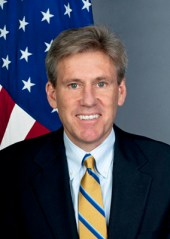The U.S. Consulate in Benghazi is seen in flames during a protest by an armed group said to have been protesting a film being produced in the United States Sept. 11, 2012.
In an attack sure to have an explosive impact on U.S. relations with Libya, Chris Stevens, the newly installed U.S. ambassador to Libya, died after protesters attacked the U.S. consulate building in Benghazi on Sept. 11, apparently in protest at an anti-Islam film produced by a little-known Israeli-American called Sam Bacile and promoted by the rather more infamous Florida preacher, Terry Jones. Suleiman El Dressi, a producer for the Al Jazeera TV network, reported in a broadcast from Benghazi that the conflagration started after “a group of people calling themselves ‘Islamic law supporters’ heard the news that there was an American movie involving the Prophet Mohammed. Once they heard this news they came out of their military garrison and they went into the streets calling on people to go ahead and attack the American consulate.” Three other U.S. personnel also died in the violence, including a Foreign Service official called Sean Smith. The victims “exemplified America’s commitment to freedom, justice, and partnership with nations and people around the globe, and stand in stark contrast to those who callously took their lives,” said President Obama in a statement released soon after the deaths were verified.

U.S. State Department
Reports had begun to filter out early Wednesday morning that Stevens had died of smoke inhalation during the attacks, after protesters lobbed grenades at the compound. Footage showed the consulate grounds ablaze in the late-night darkness. The U.S. does not maintain a permanent presence in Benghazi, and embassy staff travel with the ambassador. Sources in Benghazi told TIME’s Steven Sotloff that the Libyan security forces battled to secure the compound for two hours and also tried to rescue the ambassador, who had survived the brutal war last year as the U.S. wartime envoy to the rebels’ Transitional National Council, arriving after a lethally dangerous boat journey in April last year, a month after NATO began its bombing campaign against Gaddafi forces. The ambassador quickly formed close ties to the rebels’ council members, who would finally emerge as the new post-war government. At the liberation ceremony last October in Benghazi’s stadium grounds, Stevens was seated on stage alongside the new leaders.
(PHOTOS: Protesters Scale U.S. Embassy Walls, Tear Down American Flag)
Libyans who have spent years forging ties with U.S. officials fear that the deaths could have a major impact on their country as it works to recover after decades of dictatorship and economic underdevelopment under Muammar Gaddafi’s dictatorship. “This is a major disaster, really,” says Sami Zaptia, co-editor of the English-language online Libya Herald. Zaptia, who also acts as a regular consultant to NGOs and visiting Western trade missions, held several recent meetings with Stevens, and was impressed by the ambassador’s easy ability to connect with Libyans. “He spoke really nice Arabic,” he says. “He was a very gentle, affable man. He was very approachable. He got into his job full-heartedly.”
Stevens had spent years as a North Africa expert. He was a Peace Corps volunteer in a small mountain town in Morocco, where he taught English after graduating from the University of California at Berkeley. A tall, lean native Californian, Stevens recorded a video before he began as ambassador, introducing himself to Libyans with the Arabic greeting, “Salam wa aleikum ,” and explaining that he spoke Arabic, and was thrilled to be heading to the country. ““I quickly grew to love this part of the world,” he said. “I’ve spent almost my entire career in the Middle East.”
(MORE: Cairo and Benghazi’s Anti-America Attacks: Two Sets of Fundamentalisms Unleash Havoc)
In Washington, shock is mixed with fury over Libya’s failure to act against violent Islamic militants, despite recent attacks against aid agencies there, and warnings from NGOs and Western governments over the rising threat of violence. After Salafist militants recently attacked a Sufi shrine, Libya’s Interior Minister Fawzi Abdelali was quoted as saying he did not want to not risk the lives of his personnel in order to apprehend the culprits. He subsequently resigned. “The Libyan authorities have been irresponsibly lazy in confronting this threat,” says Tom Malinowski, Washington director of Human Rights Watch. “They have a choice to make: Are they going to be a country connected to the outside world, or are they going to allow a small number of people in their midst make that impossible.”
Malinowski, who had met with Stevens several times in Libya and Washington, says the ambassador had a “very strong feeling for Libya, forged during tough months in Benghazi last year. He was virtually alone from the early days of the revolution. Libyans have to wake up and realize someone in their midst just killed one of their greatest friends.”
(PHOTOS: Libya Celebrates Liberation)
Stevens inaugurated the new embassy in the capital Tripoli just three weeks ago, on Aug. 28, telling Libyans at the opening ceremony what many had waited years to hear: That they would finally be welcome to visit the U.S., and that Washington would begin long-awaited exchange programs for Libyans. “Since returning to Libya as ambassador in May, the one question I have heard almost every day from Libyans is: when are you going to start issuing visas again?” Stevens told the embassy guests. “Now, at last, you have your answer: Tomorrow.”
“We are heartbroken by this terrible loss,” said Secretary of State Hillary Clinton in a statement. The new Libyan government, installed only last month, is struggling to restore security over the vast, oil-rich nation. Months of war last year left militia groups in effective control over bits of turf, protected by mountains of weapons left abandoned by Gaddafi’s regime. Bringing those weapons under government control has proved a daunting task since Gaddafi’s death last Oct. 20. Now, that task has become even more urgent.

